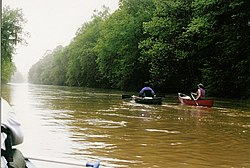| Wolf River | |
|---|---|
 Wolf River in Germantown | |
| Location | |
| Country | United States |
| Physical characteristics | |
| Source | |
| • location | Baker's Pond, Holly Springs National Forest, near Walnut, Mississippi |
| • coordinates | 34°56′36″N 89°01′55″W / 34.94333°N 89.03194°W |
| • elevation | 540 ft (160 m) |
| Mouth | |
• location | Mississippi River at Downtown Memphis, Tennessee |
• coordinates | 35°10′57″N 90°03′25″W / 35.18250°N 90.05694°W |
• elevation | 210 ft (64 m) |
| Length | 90 mi (140 km) |
| Basin size | 889 sq mi (2,300 km2) |
| Discharge | |
| • average | 1,327 cu ft/s (37.6 m3/s) |
The Wolf River is a 105-mile-long (169 km) alluvial river in western Tennessee and northern Mississippi, whose confluence with the Mississippi River was the site of various Chickasaw, French, Spanish and American communities that eventually became Memphis, Tennessee. It is estimated to be about 12,000 years old, formed by glacier runoff carving into the region's soft alluvial soil. It should not be confused with The Wolf River (Middle Tennessee) which flows primarily in Middle Tennessee and southern Kentucky. The Wolf River rises in the Holly Springs National Forest at Baker's Pond in Benton County, Mississippi, and flows northwest into Tennessee, before entering the Mississippi River north of downtown Memphis.
In 1985, the Wolf River Conservancy was formed in opposition to plans for additional channel dredging. In 1995 the "Ghost River" section of the Wolf was saved from timber auction by a coordinated effort of the Tennessee Wildlife Resources Agency, the Tennessee Department of Environment and Conservation, local conservation activists, and the Wolf River Conservancy. In 1997 the river was designated an American Heritage River by presidential proclamation under a special United States Environmental Protection Agency program. In that same year, musician Jeff Buckley accidentally drowned in the Wolf River while swimming in Memphis. In 2005 the Wolf River Restoration Project was commenced to stop rapid erosion at Collierville, Tennessee. The river serves to mitigate flooding and erosion, as habitat for wildlife, as a recreational area, as well as supplying clean water to an underground aquifer.

